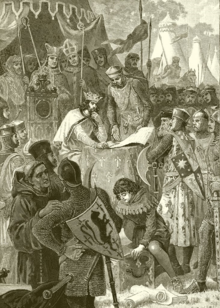| English feudalism |
|---|
 |
| Manorialism |
| Feudal land tenure in England |
| Feudal duties |
| Feudalism |

In the kingdom of England, a feudal barony or barony by tenure was the highest degree of feudal land tenure, namely per baroniam (Latin for "by barony"), under which the land-holder owed the service of being one of the king's barons. The duties owed by and the privileges granted to feudal barons are not exactly defined, but they involved the duty of providing soldiers to the royal feudal army on demand by the king, and the privilege of attendance at the king's feudal court, the Magnum Concilium, the precursor of parliament.
If the estate-in-land held by barony contained a significant castle as its caput baroniae[a] and if it was especially large – consisting of more than about 20 knight's fees (each loosely equivalent to a manor) – then it was termed an honour. The typical honour had properties scattered over several shires, intermingled with the properties of others. This was a specific policy of the Norman kings, to avoid establishing any one area under the control of a single lord.[1] Usually, though, a more concentrated cluster existed somewhere. Here would lie the caput (head) of the honour, with a castle that gave its name to the honour and served as its administrative headquarters. The term honour is particularly useful for the eleventh and twelfth centuries, before the development of an extensive peerage hierarchy.
This type of barony is different from the type of feudal barony which existed within a county palatine. A county palatine was an independent franchise so its baronies were considered the highest rank of feudal tenure in the county and not the kingdom, such as the barony of Halton within the Palatinate of Chester.[2]
Cite error: There are <ref group=lower-alpha> tags or {{efn}} templates on this page, but the references will not show without a {{reflist|group=lower-alpha}} template or {{notelist}} template (see the help page).
© MMXXIII Rich X Search. We shall prevail. All rights reserved. Rich X Search
